Every person with a disability is unique with their own story to tell.
We spoke to a number of local people with disabilities who were kind enough to share their stories with us.
Grace's story
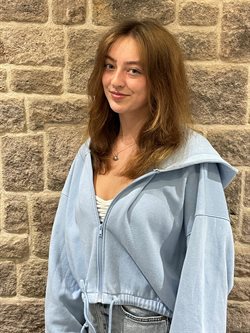 Hi I’m Grace and I’m a young person in Wigan.
Hi I’m Grace and I’m a young person in Wigan.
This year, I am running in the youth elections for the role of Member of UK Youth Parliament (MYP) (external link).
In my manifesto I am advocating for something very important to me, this is more forums and safe spaces for young people with disabilities, awareness and reduction of harmful language used against people with disabilities, and more accessibility in the borough.
This is important to me as growing up with a disability I felt different, judged, and rejected. That’s why I want to support young people to feel confident within their own skin and give them the support I wish I’d had when I was growing up because no young person should feel that way. I hope to create forums for young people to chat, make new friends and be able to talk and get off whatever is on their minds with likeminded people.
Through the years I never accepted that I have a disability but as I have got older, I have realised that it’s a huge part of myself I cannot change, but it also doesn’t define me as a person which is a key message I want to share with other young people. I am still able to achieve my goals in my life.
Being a member of Wigan and Leigh Youth Cabinet has helped me improve my confidence to speak out about any issues I think need addressing, so my main campaign if I am elected as MYP is to try and diminish bullying.
Bullying makes people feel more isolated and this is why I also want more education on disabilities as people fail to acknowledge they can be hidden. They can be mental or physical and affect people differently. I want to also be able to set up somewhere to anonymously voice issues to make people feel more comfortable with sharing their problems in the first place.
Any young person reading this please vote in the UK Youth Parliament elections when the opportunity comes to your school or college to make a change, because it starts with you.
If you want to join Wigan and Leigh Youth Cabinet so you can get your opportunity to have a say and make a difference for young people please email tyssweb@wigan.gov.uk.
Sue's story
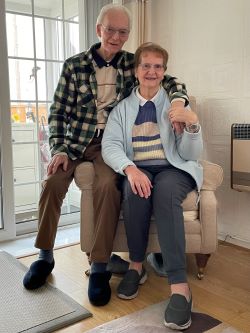 Sue lives with her husband Ray in Winstanley. She has lived with several disabilities since having breast cancer more than 20 years ago. Sue, 75, and Ray, 83, kindly talked to us about the impact her disabilities have on her life, the challenges the pandemic brought, and their advice to anyone who develops disabilities as they go through life.
Sue lives with her husband Ray in Winstanley. She has lived with several disabilities since having breast cancer more than 20 years ago. Sue, 75, and Ray, 83, kindly talked to us about the impact her disabilities have on her life, the challenges the pandemic brought, and their advice to anyone who develops disabilities as they go through life.
Sue says: One of the side effects of the treatments I had for breast cancer is that I have osteoporosis, which means that my bones are much weaker and can break easily.
I’m also weaker on my left side, where the cancer was, which can mean my balance isn’t always good, and so I’ve had several falls, which have led to lots of operations and more complications.
My life has changed quite a bit. I can’t get myself dressed without help as I can’t do my shoes or zips. We have rails on the stairs, bed, and in the shower to help me get around. I’m petrified on stairs as I’ve had a few serious falls there.
I have a walker to help me, but I have to be careful all the time, which has been a big change.
I don’t know what I would have done without Ray. After one operation he took on all the cooking and I would give him instructions on how to cook salmon. Our sons came over and they made a Sunday dinner between them all. It must be very difficult if this sort of thing happens to you and you’re on your own.
I did have a stage where I felt I needed to speak with a professional about how I was feeling. Our GP put me in touch with someone and we talked through a few things, but I feel like I’ve come out of that now.
At first the pandemic was ok as we got used to everything being quiet and it felt as though everyone was in the same boat. We had our shopping delivered and our family, friends and neighbours were helpful so there was no pressure to go out.
As everything opened up again, I did feel a bit insecure, but we decided it was important to get out and mix with people again.
We try to go out somewhere every day, even if just for an hour.
We’ve found a group of people through our surgery, and we all go on an organised walk once a month around Scotmans Flash. It’s a beautiful area and right on our doorstep, we didn’t realise it was there. We can walk at our own pace and talk to each other and everyone in the group is so different that we’ve learned lots from each other.
To anyone reading this I would say, don’t judge other people. Some disabilities might be hidden so always ask if someone looks like they might need some help.
To people who do develop disabilities as they go through life, I would say, it is hard at first. But there is a light at the end of the tunnel if you’re prepared to join in.
It’s surprising how many people do want to speak to you if you start a conversation so just say hello and see what happens.
Debra's story
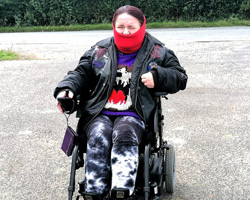 As an older person (56) with a disability that I have had from birth, sex and relationships in my life have been somewhat of a ‘hit and miss’ situation. What that means is yes, I have had relationships, and sex, but for one reason or another they didn’t last very long until I thought I’d found ‘the one’ although this didn’t work out in the long term. People think as a seemingly severely physically impaired person I am unable to have sex. If so, they need to go back to school to the sex ed class as where do they think my daughter comes from? People also believe that as a seemingly severely physically impaired person, I should not have sex, because sex could lead to children and that I may not be able to care for a child because I am so physically impaired. Very much not true. As an equal parent (remember it takes 2 people to conceive a baby, so therefore it should be 2 people raising that child), I can do equal care for the child, the same as a non-disabled parent. It just means the tasks of care are adjusted to the tasks I am physically capable of (and it’s a lot). You also build your own caring equipment to make life easier, and your own ways of having a caring routine. Not unlike a non-disabled parent. I did think long and hard of the consequences of becoming a parent before I conceived, just like non-disabled parents should do. (It was my decision to have only 1 child).
As an older person (56) with a disability that I have had from birth, sex and relationships in my life have been somewhat of a ‘hit and miss’ situation. What that means is yes, I have had relationships, and sex, but for one reason or another they didn’t last very long until I thought I’d found ‘the one’ although this didn’t work out in the long term. People think as a seemingly severely physically impaired person I am unable to have sex. If so, they need to go back to school to the sex ed class as where do they think my daughter comes from? People also believe that as a seemingly severely physically impaired person, I should not have sex, because sex could lead to children and that I may not be able to care for a child because I am so physically impaired. Very much not true. As an equal parent (remember it takes 2 people to conceive a baby, so therefore it should be 2 people raising that child), I can do equal care for the child, the same as a non-disabled parent. It just means the tasks of care are adjusted to the tasks I am physically capable of (and it’s a lot). You also build your own caring equipment to make life easier, and your own ways of having a caring routine. Not unlike a non-disabled parent. I did think long and hard of the consequences of becoming a parent before I conceived, just like non-disabled parents should do. (It was my decision to have only 1 child).
So why am I single after over 20 years of a relationship breakdown? Well, the answer is not because I am severely physically impaired, as people may think. The reason is because the breakdown of my long term relationship has broken me so emotionally that I don’t feel I can trust or emotionally release myself to bare another relationship. Am I happy? Yes, because there are all kinds of happiness, love, relationships. You don’t have to have sex to feel loved. My close friends make me feel loved. My daughter shows me love as we are not just mother and daughter but best friends (a relationship that all mums aspire to have with their daughters, but some never get). I live alone, but I am not lonely, people treat these as the same, but they are not.
As for sex, well as a mature woman, sex without love, is really not something I aspire to have. If one day a man comes into my life that can see the woman, I am beyond what they think I am, then who knows? But I neither go searching for him or hoping for him. I live life to the fullest that I am capable of, caring and sharing my life with others who need someone to hold their hand whilst they live through their troubles. Living your life on your terms, is what true peace and happiness is all about.
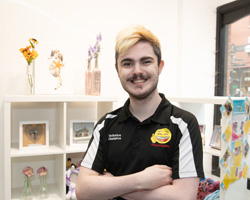
Kurt's story, Orrell
I’ve always loved to learn. In high school we had a chemistry lesson where we made a green powder turn black and that sparked my interest in science. I love anything to do with evolution and planets. I think it’s about looking into the unknown and then finding out how it all makes sense. One of my achievements is getting the 100% attendance award in college.
I did 4 years at St. John Rigby, and I didn’t miss a day. I was born prematurely, which caused my disabilities. I can walk with a walking stick and I’m deaf. I wear one hearing aid and I could wear two but that sometimes makes the background noises louder, which can be distracting. I think some problems for people with disabilities come from not being allowed to do things.
Your family might not want you to go to the cinema until you’re older, because they care about you and want to protect you, but you might feel ready for that. My mum has always fought for me to make sure I could have a go at anything I wanted to do when I was growing up. I said I wanted to try trampolining and guess what, the next thing I knew I was doing it.
I’d like to open people’s minds and give them a different perspective, my message to younger children with disabilities is to always be yourself and never give up. People with disabilities can do things, it doesn’t matter if we’re in a wheelchair or not, there are always ways we can do things. My ambition for the future is I’d like the public to see this. And in the immediate future, I’d also like to get a tattoo!
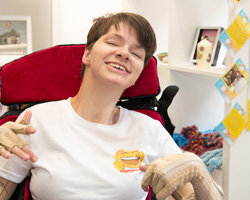
Amy's story, Lowton
I’m a big Manchester United fan and have been a season ticket holder for years. My family are very important to me, especially my two nephews, Luke and Adam. We’re a similar age so we were all brought up together and always go to the matches together.
I also enjoy art and go to an art group in Leigh every Tuesday, where I have a special grip so I can hold the paint brush. I do voluntary work and have been delivering inclusion awareness sessions with Happy Smiles. My disability means I’m non-verbal and use a communication chart with letters on that I point to. I’m just getting back into using this again.
When I was young, I went to Mere Oaks School for children with special educational needs, but the school closed when I was 14, so then I went to Hindley High School, and I learned to read and spell there.
One of the things that annoys me is when people talk to my PA (personal assistant) instead of me, so my message to people in the borough would be to always speak to people with disabilities directly and not to their PA. My message to other people with disabilities is, you can do anything you choose.
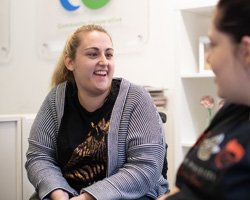
Chloe's story, Wigan
I was born at 24 weeks. I have eye sight problems, I can’t see very well, and I use my sticks to walk and a wheelchair for longer distances. My disabilities do impact on my life but at the same time I’ve had my disabilities from birth so have never known any different. My mum brought me up to appreciate that we do not live in a flat world!
I have my own home and I do get support so that I can live independently. One of the messages I’d most like to get across is that even though people with disabilities might need support to do some things, many of us make a valuable contribution to society.
I volunteer at ‘Use ‘Ya’ Loaf’ in Atherton, a community interest company, which aims to reduce food waste and food poverty. I also volunteer at Happy Smiles, running training workshops about inclusion, and at Canine Companions, a dog day care centre in Wigan. I’ve always loved animals and have a University Foundation Degree in Animal Welfare.
In my spare time I like going out for food and drinks with friends and going to the cinema. I mostly like action films and romantic films, but I don’t like horrors. My hope for the future is to continue doing what I’m doing now and to show that disabled people can contribute a lot to society by volunteering and helping others.
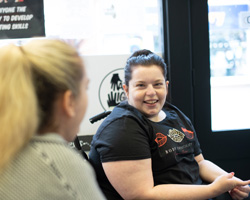
Elle's story, Wigan
I would describe myself as a positive, happy, and sociable person. I enjoy watching TV shows, my favourites are the soaps, especially Corrie and TV dramas. I have cerebral palsy, which for me means I sometimes have difficulties with movement, and I mostly use a wheelchair to get about.
My biggest achievement has been recently moving into my own bungalow and getting some independence. My message to everyone is to be as positive as you can in life.
Watch Debra’s story
Debra, from Winstanley, is a disability activist who runs training workshops on disability awareness, campaigns for the rights of disabled people at a local and national level and is the founder and lead officer of Wigan Boroughwide Peer Support Group.
Watch Haydn’s story
Haydn has worked with Alex to set up Happy Smiles Training CIC, a local organisation which runs training sessions on inclusion and helps people with disabilities to build their skills and confidence so that they can move onto employment or volunteer opportunities. Alex and Haydn discuss Haydn’s experiences as a young disabled person.
Watch Anna’s story
Anna talks about life as a young wheelchair user, the things that annoy her, her messages to the wider society and her collection of Doc Marten boots.